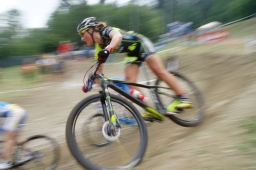Getting psyched for sport - Mental fitness strategies for the aspiring athlete
Wednesday, June 15, 2016 - 09:12

Mental fitness plays a large part in training and performance. There will be times when an athlete makes a mistake (or consecutive mistakes), is competing against an opponent that has outperformed them in the past, or the conditions of play are not what was expected. Being mentally fit encapsulates many different areas of training and competition but in a nutshell, it’s the ability to ignore distractions, focus on specific goals and outcomes, and effectively move past challenging moments.
How can an athlete improve their mental fitness?
Manage expectations: As individuals, it’s easy to set the bar high with the idea that big goals mean big gains. Fortunately, coaches are excellent resources for objectivity when assessing training or competition outcomes. If goals are realistic and attainable, it encourages the athlete to keep trying, keeping in mind past successes when things get tough. When a competition is complete, athletes and coaches should evaluate progress made, learn from any errors, and give credit when goals are met, big or small.
Anticipate the unexpected: In any race or competition, there is always room for ‘speed bumps’ to occur; a piece of equipment may break or the weather doesn’t cooperate. These ‘bumps’ are common distractions, and an athlete should be able to maintain concentration on their objective, and trust that the training and preparation they put in will carry them through the upcoming event.
Know what works for you: This ties in with the strategy above - when under pressure, know what works to lessen the stress. Is there a set warm up routine that can be implemented? For a lot of people, routine can be a calming influence when the mind is anxious. Is there a favourite playlist or song that gets you pumped and excited to compete? Individual athletes can also practice breathing or visualization techniques to aid them on competition day.
Stay positive: Self-talk such as “I’ve done this before, I can do it again” or “I am strong, I can do this” focuses on positive wording to reinforce the mind and body to persevere when things get tough. Phrases such as “don’t give up” or “push through the pain” have negative associations and may chip away at confidence.
Self belief - When an athlete is confident in their abilities, they are more readily able to convert sporting potential into an exceptional performance. On the other hand, if an athlete has doubts, the smallest setback can sometimes knock them off track. Self-confidence can stem from a variety of areas: preparation, i.e., training and drills; past competition experience; an athlete’s support system - their coach, parents, and teammates; and, past successes.
Developing mental fitness is a process and not something that develops overnight. It takes patience, conscious effort, and when possible, some guided direction from a coach or sport psychologist. Imagery and visualization techniques can be exceptionally useful for the aspiring athlete and can assist with achieving peak performance levels. When used in tandem with a well-planned training regimen, the combination can provide the edge that every athlete is looking for.
References:
Gamarra A, Matheny R. It's a mental game, too: imagery and awareness are skills that can be developed. Soccer Journal. November 2003;48(7):24-26.
Klarica A. What Makes a Champion?. Modern Athlete & Coach. January 2011;49(1):20-21.
Mahoney J, Gucciardi D, Ntoumanis N, Mallet C. Mental Toughness in Sport: Motivational Antecedents and Associations With Performance and Psychological Health. Journal Of Sport & Exercise Psychology June 15, 2014;36(3):281-292.
Perlus H. Visualization as the #1 Mental Toughness Tool. IDEA Fitness Journal.. March 2016;13(3):66-69.
Philippe R, Sagar S, Gerber M, Hauw D. Players' Perceptions of Coaches' Contributions to their Mental Toughness. International Journal Of Coaching Science. January 2016;10(1):37-51.
About the author: Michelle is an information management specialist with many years focusing on sport and fitness research and education. Michelle has been sharing her expertise with SIRC for over 3 years.